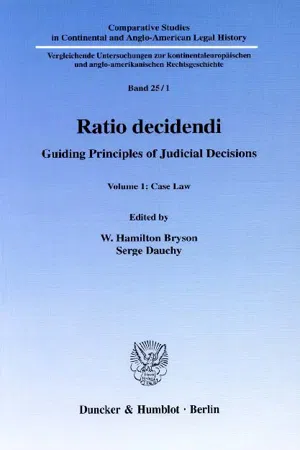
Ratio decidendi.
Guiding Principles of Judicial Decisions. Vol. 1: Case Law.
- 293 pages
- English
- PDF
- Available on iOS & Android
Ratio decidendi.
Guiding Principles of Judicial Decisions. Vol. 1: Case Law.
About this book
Although the problem of ratio decidendi concerns the essence of law and justice, very little comparative work between the Continental and Anglo-American legal systems has been done on the topic. Legal literature often repeats that it is one of the sharpest points of contrast between the two legal cultures. Within the English speaking legal system, multiple opinions, both concurring and dissenting, prevail where dissent among Continental judges only occurs behind closed doors: the published decision indeed is always presented as the single and incontestable opinion of the whole court. Historical reasons are generally put forward to explain that contrast. Where in the Anglo-American Common Law system judges are asked - and always have been asked - to present the materials and reasons upon which they based their judicial opinions, in Ancien Régime continental Europe it was not considered necessary to formulate the reasons of a decision and in most courts of the European Continent it was even formally forbidden to the judges, until the end of the eighteenth century, to write down or even communicate orally "the secrets of their discussions and deliberations".To comparatists, this reveals two different cultures among judges and lawyers. In Continental Europe there is much emphasis on the idea of judging as a science which can be learned and reproduced with an impersonal rigour. The Anglo-American judge is not considered to be such a trained scientist, he is merely a practised craftsman. Can the history of ratio decidendi - but also the history of law and justice from the Middle Ages to the nineteenth century - therefore be reduced to a total contradiction between two legal cultures?
Frequently asked questions
- Essential is ideal for learners and professionals who enjoy exploring a wide range of subjects. Access the Essential Library with 800,000+ trusted titles and best-sellers across business, personal growth, and the humanities. Includes unlimited reading time and Standard Read Aloud voice.
- Complete: Perfect for advanced learners and researchers needing full, unrestricted access. Unlock 1.4M+ books across hundreds of subjects, including academic and specialized titles. The Complete Plan also includes advanced features like Premium Read Aloud and Research Assistant.
Please note we cannot support devices running on iOS 13 and Android 7 or earlier. Learn more about using the app.
Information
Table of contents
- Contents
- Laurens Winkel: Ratio Decidendi - Legal Reasoning in Roman Law
- Jean Hilaire: Ratio decidendi au Parlement de Paris d’après les registres d’Olim (1254-1318)
- Paul Brand: Reasoned Judgments in the English Medieval Common Law 1270 to 1307
- Richard H. Helmholz: The Ratio Decidendi in England: Evidence from the Civilian Tradition
- Véronique Demars-Sion et Serge Dauchy: La non motivation des décisions judiciaires dans l’ancien droit français: un usage controversé
- John Finlay: Ratio Decidendi in Scotland 1650 to 1800
- James Oldham: Lord Mansfield, Stare Decisis, and the Ratio Decidendi 1756 to 1788
- J. Thomas Wren: The Common Law of England in Virginia 1776 to 1830
- Charles F. Hobson: Precedent, Statute, and Law in John Marshall’s Jurisprudence 1801 to 1835
- Jean-Louis Halpérin: The Court of Cassation in Nineteenth-Century France and the Binding Effect of Rationes Decidendi
- Georges Martyn: The Judge and the Formal Sources of Law in the Low Countries (19th-20th Centuries): From ‘Slave’ to ‘Master’?
- Matthew C. Mirow: Case Law in Mexico 1861 to 1919: The Work of Ignacio Luis Vallarta
- Bernard Durand: Motivations des décisions de justice et contrôle des motifs: la pratique judiciaire coloniale sous la troisième République
- Knut Wolfgang Nörr: Zur Bindungswirkung von Entscheidungsgründen: das Beispiel des deutschen Bundesverfassungsgerichts
- W. Hamilton Bryson: Summary Conclusion
- Contributors